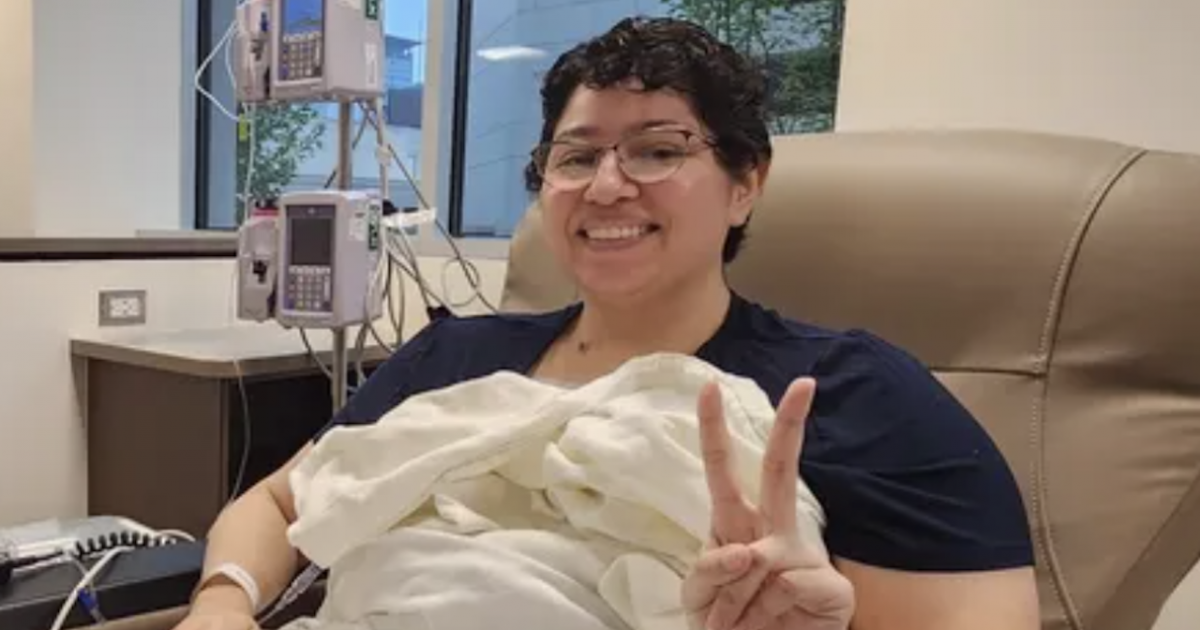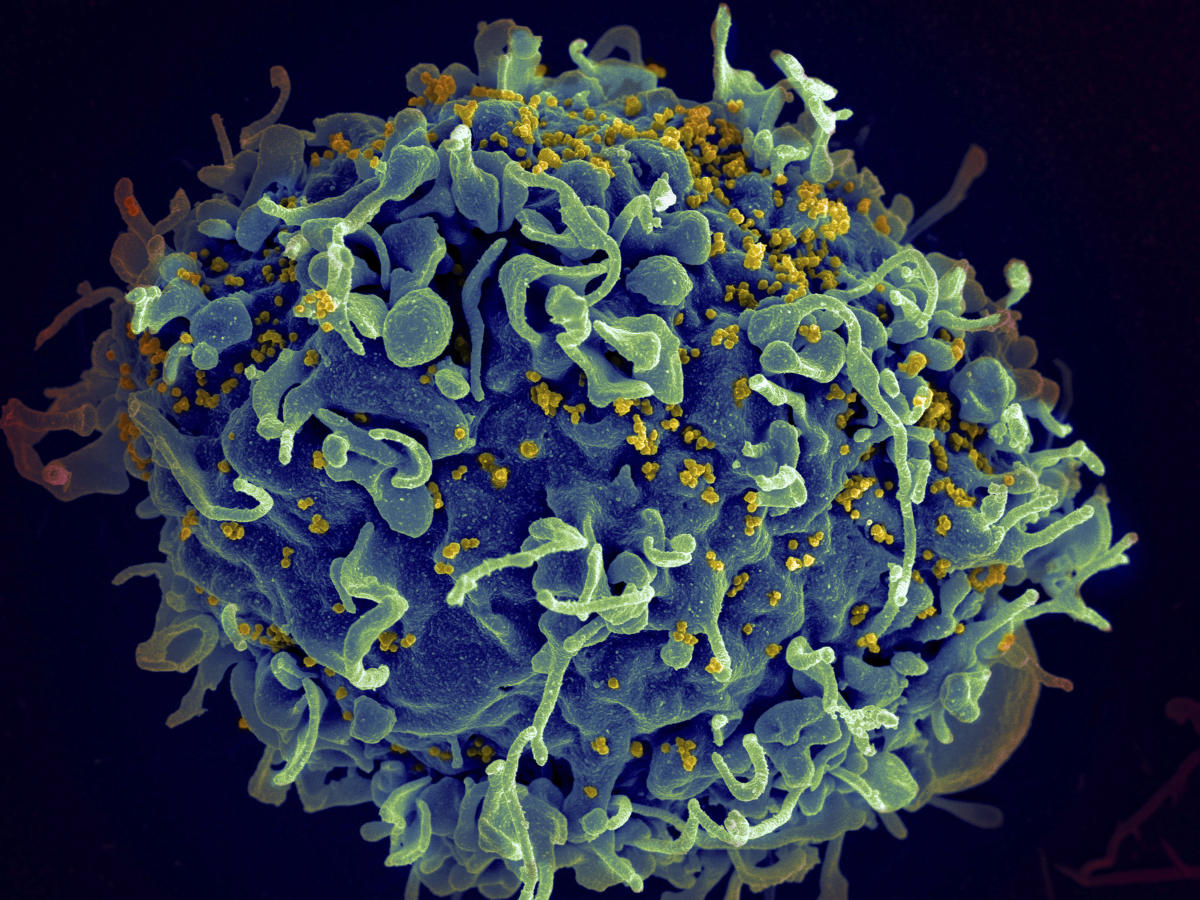A 33-year-old woman had experienced years of digestive issues, including painful and bloody bowel movements, but when she finally sought medical advice, she was informed it was likely anxiety or gas. However, it turned out to be colon cancer. Now she’s opened up about her cancer journey to inspire others not to ignore symptoms and be your own advocate when it comes to your health.
Raquel Aguilar was 32 when she was diagnosed with stage 4 metastatic adenocarcinoma, which originated in the colon, last June—just weeks after her symptoms were “incredibly dismissed” by her doctor.
@feltica It might not be the dairy or the coffee causing you to run to the bathroom. Take your bowel health seriously, and if you have any of these symptoms make sure you and your doctor check for cancer first. #cancer #colon #colorectacancer #ibs #millennial #genz @colorectal cancer alliance
Since Aguilar didn’t have health insurance when she first started noticing symptoms, she held off to see her primary doctor and instead took a fiber supplement called Metamucil to help make her bowel movements more regular, and help with occasional diarrhea.
It wasn’t until 2021 that the California native moved to the greater Seattle area and obtained a job with good health insurance, she explained, however she still didn’t get checked until her symptoms worsened.
She explained to Self, “My symptoms remained quiet until they came back in 2022. I was going to the bathroom a lot again, and my bowel movements became uncomfortable. My stools were pencil-thin, sometimes orangish-red in color, and occasionally there’d be a little blood. I got abnormally full after eating. I was bloated, no matter what I ate—I tried being dairy-free, then gluten-free.
“Looking back, these were major warning signs that something was wrong, and I wouldn’t find out until later that they were classic signs of colorectal cancer.”
That was when she made an appointment to see her doctor in May 2023, for the first time in more than 10 years.
Expert Resources On Colorectal Cancer
Looking back on how her appointment went, Aguilar said, “I told my doctor about the digestive issues I’d been experiencing since 2019: the frequent—and sometimes painful—bowel movements, the bloody stools, the early satiety. I shared that it felt like my symptoms were getting worse, and she said I likely had anxiety—and maybe gas—and scheduled a psychiatric appointment for me.
“I believed her. I thought, ‘Maybe she’s right: I’m worrying too much about these symptoms and should just let it go.’ In retrospect, she was incredibly dismissive, which I think was a result of my being so young at the time—I was 32, a woman, and a minority. Statistically speaking, people who fall into any of those categories, let alone all three of them, tend to have their health issues dismissed by doctors.”
It wasn’t until three week after the appointment that she began feeling severe abdominal paid which radiated throughout all of her abdomen and in the direction of her lower back, something she described as “unbearable.”
She explained further, “I’m not somebody who’s quick to take medication or go to the doctor, but I knew something was wrong, so I went to the emergency room. Again, I doubted myself and thought that perhaps I was making a big deal out of nothing. Fortunately, my ER physician took my pain seriously—she ordered a CT scan, scheduled an abdominal ultrasound, and ran a full panel of blood work. When the results came in, she sat down and told me they found cancer on my ovaries and liver. I was diagnosed with ovarian cancer.
“I met with an oncologist and had a liver biopsy. That’s when they discovered that the cancer, adenocarcinoma, had originated in my colon and metastasized, or spread, to other organs. I was diagnosed with stage four colorectal cancer.”
Doctors then did an endoscopy and a colonoscopy to learn more about the cancer, revealing he “colorectal cancer was so large and so advanced that they had trouble getting the scope through my colon.”
@feltica #stitch with @BexPanther You deserve answers. It takes one doctor who cares to change your life. #healthcare #health #americanhealthcare #women #fyp #pain
Aguilar started chemotherapy soon after her diagnosis and needed to change her diet due to the disease causing “buildup of fluids” in her stomach in my stomach, which needed to be drained.
She undergoes chemo every two weeks and has had genetic testing to see if anything could be linked to her diagnosis. Aguilar also had blood tests done to check how her cancer is progressing, which includes various cancer marker test.
Despite all that Aguilar has been through during her journey with colon cancer, its uplifting to see how optimistic she remains, even after doctors informed her that chemo will eventually stop working.”
She explained, “I don’t qualify for surgery, since my cancer has spread so deeply, but I’m continuing to look into surgical options along with new treatments and clinical trials I can participate in.
“My chances of reaching survival two years after the diagnosis was 20%. At five years, that drops to 5%, but I’m determined to beat the odds.”
Aguilar insists that following her “intuition” is what has helped her stay alive today, as she felt she was “dismissed for years.”
She concluded, “I’ve learned how important it is to get a second opinion—all you need is that one doctor who is going to listen and fight for you. You might not find that person right away, but keep pressing: Getting screened could be a matter of life or death… It’s so easy to doubt yourself, especially if medical professionals are downplaying your symptoms.
“But if you feel like something is wrong, go with your gut. It’s usually right.”
As Aguilar continues to raise awareness for colon cancer, she’s also raised nearly $3,000 on a GoFundMe page set up to help with her medical bills.
“I’ve begun sharing my story on TikTok to raise awareness that colorectal cancer is no longer an older persons disease. I’ve spoken to hundreds younger than 30 with stage 3 or 4 colon cancer. I’m hoping I can help others, since early detection is key to survival,” she wrote on the GoFundMe page.
“Although my prognosis is not good, I’m going to give a good fight.”
Colon Cancer: A Silent Killer
Dr. Heather Yeo, a colorectal surgeon and surgical oncologist at Weill Cornell Medicine and New York-Presbyterian, previously told SurvivorNet, “Colon cancer is considered a silent and deadly killer.
“What happens is people often don’t know that they have colon cancer. They don’t have any symptoms. That’s why we screen for colon cancer in the United States.”
The Rate of Colon Cancer is Increasing in Those Under 50
“You should be screened for colon cancer, even if you have no family history. Once you have your initial screening colonoscopy, if there are no polyps and you have no high-risk factors, usually once every 10 years is fine,” she advises.
“Colon cancer is a slowly progressing cancer. If you have any family history of colon cancer, you should be screened about 10 years before your family member had colon cancer. So if you have a family member that was 53, you should be screened at 43.”
Colon Cancer Appearing More in Younger People
It’s great to see Aquilar sharing her cancer journey to help others notice the symptoms early on and prevent getting dismissed by doctors at a young age.
Although the average age people are diagnosed with colon cancer is 68 for men and 72 for women, according to the American Cancer Society, the National Cancer Institute reports that since the 1990s, colorectal cancer cases have been rising among adults younger than 50.
Research published in CA: A Cancer Journal for Clinicians found the proportion of cases in people younger than 55 years old increased from 11% in 1995 to 20% in 2019.
“We know rates are increasing in young people, but it’s alarming to see how rapidly the whole patient population is shifting younger, despite shrinking numbers in the overall population,” cancer epidemiologist and lead study author Rebecca Siegel said.
Researchers are still trying to determine why younger people are being diagnosed in greater numbers. Some experts point to risk factors which include obesity, physical inactivity, and smoking as a possible explanation for the increase.
“We don’t know for sure why we are seeing earlier onset and death from colon cancer,” Dr. Heather Yeo, a surgical oncologist who specializes in colorectal cancers at Weill Cornell Medicine, told SurvivorNet.
“It is likely a combination of factors, including diet and genetics as well as access to care and some environmental factors,” Dr. Yeo added.
Screening for Colon Cancer
Luckily, most colon cancers can be prevented through routine screenings. Colon cancer screenings usually involve a colonoscopy, in which a long thin tube attached to a camera is used to examine the colon and rectum.
MORE: All Americans Should Begin Colorectal Cancer Screening at Age 45, According to New Guidelines; Previous Age Was 50
The advantage of a colonoscopy is that your doctor can remove any polyps found during the test before they turn into cancer. If no polyps are discovered, the next screening won’t be needed for about 10 years.
Dr. Paul Oberstein Explains Common Colon Cancer Symptoms
A colonoscopy isn’t the only colon cancer screening test. There are other options, including stool tests that detect blood or DNA, and flexible sigmoidoscopy, which checks only the lower third of your colon.
Ask your doctor whether any of these tests would be good additions to a colonoscopy, based on your risks and/or personal preferences.
RELATED: Can the Stuff in My Gut Cause Cancer? There May Be A Link to Colon Cancer
“We know that colon cancers can be prevented when polyps are found early,” Dr. Yeo added. “Lowering the screening age helps somewhat with this, but access to care is a real problem.”
The American Gastrointestinal Association lowered the recommended initial age for a colorectal screening from 50 to 45.
“The fact that we have now reduced the screening age to 45 is a huge step,” Michael Sapienza, CEO of Colorectal Cancer Alliance, told SurvivorNet in an earlier conversation.
“It will allow us to potentially screen 15 million more eligible Americans a year and will certainly save lives. I also think what it’ll do is bring much-needed attention that even if you’re younger than 45 you should be paying more attention. I think that’s also a really important message.”
What Increases Your Risk for Developing Colon Cancer?
For some people, certain risk factors can influence their risk of getting colon cancer. They include the following:
- Are older. About 90% of cases are in people aged 50 or older, according to the U.S. Centers for Disease Control & Prevention (CDC). Yet it is possible to get this cancer earlier in life.
- Have inflammatory bowel disease. Crohn’s disease or ulcerative colitis can, over time, cause cells in your intestines to turn cancerous.
- Have a family history of this cancer. Just under one-third of people who get colon cancer have family members with the disease.
- Have a gene mutation. About 5% of colorectal cancers are caused by an inherited genetic mutation that causes syndromes such as familial adenomatous polyposis (FAP) or hereditary nonpolyposis colorectal cancer (Lynch syndrome).
- Don’t exercise very often. Staying active can lower your risk.
- Eat a diet that’s high in meat. Regularly eating red meats like burgers and steaks, and processed meats such as hot dogs and bacon might put you at higher risk. Eating more fruits, vegetables, and whole grains instead might lower your risk.
- You are overweight or obese. Having too much weight increases your risk of both getting colon cancer and dying from it.
- Drink a lot of alcohol. Limiting alcohol to one drink daily for women and two drinks daily for men could help lower your risk.
- Use tobacco. Long-term smokers are more likely to get this cancer than nonsmokers.
Keeping Up With Recommended Screenings
As a part of routine care, people who have had colitis for eight years or more may get a colonoscopy to screen for colon cancer every one to three years, depending on their individual level of inflammation.
In the general population, guidelines recommend colon cancer screening once every ten years starting at age 45. Follow up screenings sooner than ten years are based on whether you have any abnormalities.
Dr. Heather Yeo Breaks Down Different Ways to Screen for Colon Cancer
Doctors use colonoscopies to check for abnormal growths (polyps) in the colon that can be cancerous or develop into cancer. People with colitis tend to develop a different kind of polyp than other people do, and these polyps are more likely to contain atypical or pre-cancerous cells.
“So those polyps are one step closer to developing into cancer, whereas a lot of the polyps we find in the general population are benign,” Dr. Limketkai said.
Crohn’s disease, however, is a little bit different. Because this condition can affect any part of the GI tract, Crohn’s disease only raises risk for colon cancer if the inflammation is in the colon, which varies from one person to the next.
Does inflammation cause any other types of cancer? Dr. Stephen Freedland explains.
“If it spares the colon, then we don’t have to do all the surveillance that we do in colitis,” Dr. Limketkai explained. “Of course, you may need to have colonoscopies for other reasons, and while you’re doing that, you’re getting a screening anyway.”
When it comes to inflammatory bowel disease, the major risk factor for colon cancer is untreated disease. Treatment, which may include a combination of medication, dietary changes and routine endoscopies, keeps inflammation under control. Sticking to that treatment can help keep colon cancer risk to a minimum, too.
Dr. Paul Oberstein, on which treatments doctors use to turn stage 4 colon cancer into a chronic but manageable disease
The Importance of Getting a Second Opinion
After receiving a cancer diagnosis, it’s important to remember that you can and should talk to other cancer specialists about your disease.
“If I had any advice for you following a cancer diagnosis, it would be, first, to seek out multiple opinions as to the best care,” National Cancer Institute Chief of Surgery Steven Rosenberg told SurvivorNet in a previous interview. “Because finding a doctor up to the latest information is important.”
RELATED: Second (& Third) Opinions Matter When Deciding Between Surgery or Radiation
As we highlight in several areas of SurvivorNet, highly respected doctors sometimes disagree on the right course of treatment, and advances in genetics and immunotherapy are creating new options.
Also, in some instances, the specific course of treatment is not clear-cut. That’s even more why understanding your disease’s potential approaches is crucial.
At the National Cancer Institute, a patient referral service will “guide patients to the right group depending on their disease state so that they can gain access to these new experimental treatments,” Rosenberg says.
Cancer Research Legend Urges Patients to Get Multiple Opinions
Furthermore, getting another opinion may also help you avoid doctor biases. For example, some surgeons own radiation treatment centers. “So there may be a conflict of interest if you present to a surgeon recommending radiation because there is some ownership of that type of facility,” Dr. Jim Hu, director of robotic surgery at Weill Cornell Medical Center, tells SurvivorNet.
Other reasons to get a second opinion include:
- To see a doctor who has more experience treating your type of cancer
- You have a rare type of cancer
- There are several ways to treat your cancer
- You feel like your doctor isn’t listening to you or isn’t giving you sound advice
- You have trouble understanding your doctor
- You don’t like the treatment your doctor recommends or are worried about its possible side effects.
- Your insurance company wants you to get another medical opinion
- Your cancer isn’t improving on your current treatment
Be Pushy, Be Your Advocate, Says Leading Expert
The bottom line is that being proactive about your health could be life or death. Learn as much as possible from as many experts as possible so you know you did your best to take control of your health.
Contributing: SurvivorNet Staff
Learn more about SurvivorNet’s rigorous medical review process.

Rachel Carter is a health and wellness expert dedicated to helping readers lead healthier lives. With a background in nutrition, she offers evidence-based advice on fitness, nutrition, and mental well-being.








